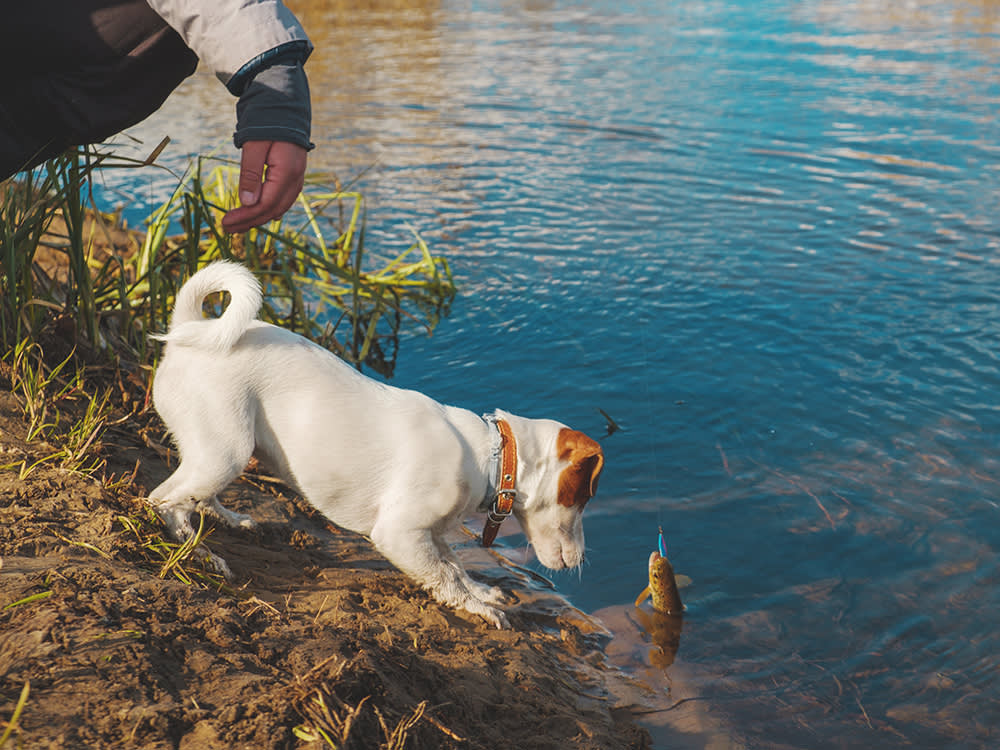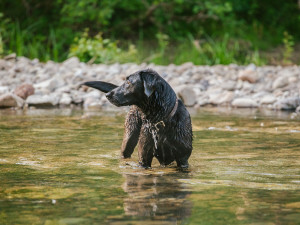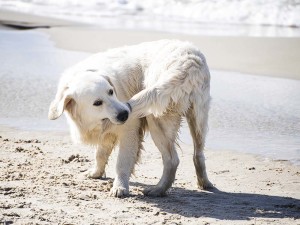Salmon Poisoning Disease in Dogs
This little-known disease can cause big problems for pups in the Pacific Northwest.

Share Article
Salmon poisoning disease (SPD) is not well known, perhaps because it only affects a few species, including dogs. Pet parents should be aware of this avoidable condition because it is potentially fatal.
What is salmon poisoning disease?
Salmon poisoning disease (SPD) is a rare but serious condition in dogs caused by the bacterium Neorickettsia helminthoecaopens in new tab, which is carried by a parasitic “fluke” flatworm. Dogs can get salmon poisoning from eating raw salmon, trout, steelhead, or even salamanders infected with fluke worm. The larvae attach themselves to a dog’s intestine and release harmful bacteria, causing severe gastrointestinal issues. As the bacterial infection spreads through the bloodstream, other organs are affected.
Symptoms are similar to distemper and typically appear around one week after eating infected fish. Signs of the disease include severe intestinal upset, fever, and swollen lymph nodes. If left untreated, up to 90 percentopens in new tab of dogs infected will not survive. Most deaths occur within two weeksopens in new tab of eating infected fish, so time is of the essence. Your veterinarian can determine if your dog is infected with these bacteria through a stool sample.
What are the symptoms of salmon poisoning?
Loss of appetite
Vomiting
Diarrhea
Severe intestinal upset
Fever
Swollen lymph nodes
High fever
Twitching
Seizures
Are others at risk for this disease?
The fluke worm, but not the bacterium, can also infect humans. While people do not contract salmon poisoning, they may show mild gastrointestinal symptoms. Cats do not appear to develop salmon poisoning.

Is your dog at risk?
The whole system of hosts, parasites, and bacteria reside in a relatively isolated geographic area— the pacific northwest, including Oregon, Washington, California, and British Columbia. Be cautious when fishing or around water in these areas. Monitor your dog closely and keep your pup away from salmon, steelhead, trout and other freshwater fish carcasses. Dogs can get infected by this disease by eating raw, undercooked, or smoked fish.
It was thought that dogs who survived an infection, were treated with antibiotics, and recovered would be immune to salmon poisoning, but that might not be the case. Another bacterium, SF agent, closely resembles Neorickettsia helminthoeca and causes similar symptoms only in a milder form. Infection from SF agent may not provide immunity to dogs from Neorickettsia helminthoeca. Pet parents should not make any assumptions about whether or not their dog has an immunity to SPD.
If your dog has eaten raw fish in this region of the world, especially if any of these symptoms are present, veterinary treatment is essential. Be sure to tell your veterinarian if your dog may have been exposed to this disease.

Karen B. London, PhD, CAAB, CPDT-KA
Karen B. London is a certified applied animal behaviorist (CAAB) and certified professional dog trainer (CPDT) who specializes in working with dogs with serious behavioral issues, including aggression. She has written for a variety of magazines including The Bark, Clean Run, and the APDT Chronicle of the Dog, and has published in scientific journals including Behavioral Ecology and Sociobiology, Ethology, Ecology, and Evolution, the Journal of Insect Behavior, and Insectes Sociaux. She is the author of seven books about dog training and canine behavior, including the forthcoming My Dog's Mystery Adventure: And Other Stories From a Canine Behaviorist and Dog Trainer.
Related articles
![Black Lab playing in creek]()
Why Your Dog Should Stay Far, Far Away From Blue-Green Algae This Summer
Consider getting a water-testing kit to keep your pup safe.
![Shepherd dog playing with yellow ball at the beach]()
How to Keep Your Dog Safe at the Beach This Summer
5 tips to help your pup have fun in the sun — safely.
![Dog biting his tail on a summer Baltic seashore.]()
Understanding Limber Tail Syndrome: Causes, Symptoms, and Treatment
Seeing your pup’s normally perky tail go limp can be unnerving, but it’s really nothing to panic about.
![Black lab swimming in pool]()
How to Keep Your Dog Safe Wherever They’re Swimming This Summer
In the pool, a lake, a river, or the ocean.



